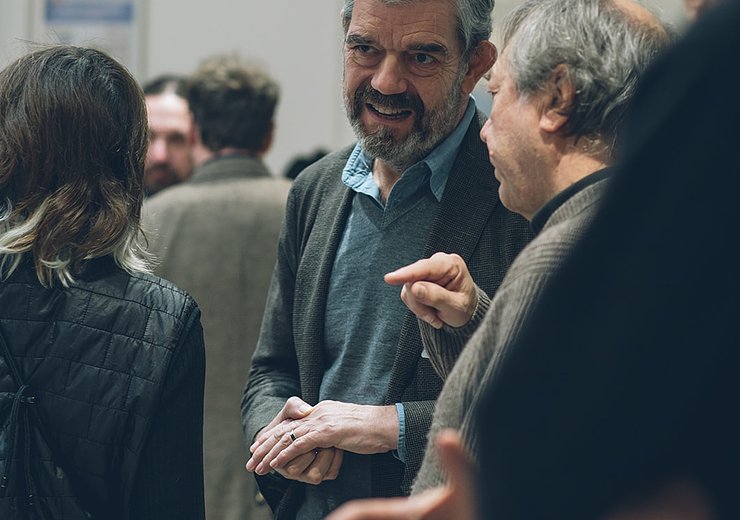A Paradigm Shift in Computer Science? Where We are, so far
On November 28 & 29, TU Wien Informatics and the Institute for Human Sciences (IWM) hosted a Workshop on the future of Computer Science.

Picture: Amélie Chapalain / TU Wien Informatics
On This Page
Report
On November 28 and 29, TU Wien Informatics and the Institute for Human Sciences (IWM) invited experts from a diverse range of disciplines to reflect on and discuss the future of Computer Science. The event, organized as a two-day workshop, focused on a possible Paradigm Shift in Computer Science, the move from logic and algorithmic certainty to probability and large language models (LLMs). It was chaired by former Dean Hannes Werthner, Professor and Head of the Research Unit Databases and Artificial Intelligence Stefan Woltran, and Permanent Fellow at the IWM Ludger Hagedorn.
The workshop featured lively discussions across eight sessions; each keynote addressed distinct questions in computer science, offering insights from different perspectives and disciplines. Following each presentation, a panel of experts discussed the topic of the keynote and answered questions from the audience in a Q&A session. The central theme of the workshop, as reflected in the title, was whether current developments in Computer Science represent a paradigm shift or a gradual evolution. Key aspects of potential change included a shift from deterministic methods to probabilistic forecasting, the unanticipated dominance of data-driven (sub-symbolic) AI, the transition from systems providing guaranteed results to humans verifying the outputs of LLMs for factual accuracy, and the opacity of LLMs.
A Paradigm Shift?
Thomas Haigh opened the workshop with his keynote “History of AI”, which offered a historical overview of AI. He highlighted the non-linear nature of its development and the challenge of defining AI itself, suggesting that it often functions more as a “brand” than a coherent technology. Following this introduction, Thomas Eiter and Sepp Hochreiter compared symbolic (logic-based) and sub-symbolic (data-driven) AI, concluding that while symbolic approaches excel in causal reasoning and providing explanations, they face scalability challenges. Conversely, sub-symbolic AI demonstrates remarkable success in vision and language tasks but struggles with “hallucinations” (viewed by some as a feature rather than a bug). A recurring theme throughout the sessions of the first day was the potential and necessity of combining both approaches to create a more powerful computational and reasoning framework, a theme that was also explored in the last keynote of the day by Frank van Harmelen.
Implications for Science and Institutions
The second day of the workshop included keynotes from Moshe Vardi, Tim Crane, Noshir Contractor and TU Wien Informatics Dean Gerti Kappel. Focal points of discussion were the transformative effects of data-driven AI on Science, from the social sciences and humanities to the natural sciences. AI has the potential to assist and redefine almost every stage of scientific inquiry, from analysis to hypothesis generation — though not model building. This raises fundamental questions about the future of science: Will we witness a shift toward science without models? All of these developments place significant pressure on Universities and scientific institutions; the question of how they will adapt their teaching and research models to respond to these changes remains, especially as large tech-companies dominate AI research and innovation.
The workshop concluded by addressing critical content and institutional challenges. While current trends and changes in Computer Science may not represent a Paradigm Shift in the Kuhnian sense, they are undeniably significant. From a philosophical viewpoint, the discussions reinforced the distinction between humans and machines, emphasizing the importance of humanities and social sciences in shaping the development of AI and in mitigating its negative impacts. The interdisciplinary framework of Digital Humanism emerged as a valuable lens for addressing complex issues in the domain of AI.
The event was made possible with the friendly support of the Verein zur Förderung des Digitalen Humanismus, the FWF Cluster-of-Excellence Bilateral AI, the Center for Artificial Intelligence and Machine Learning, the Austrian Federal Ministry of Climate Action, Environment, Energy, Mobility, Innovation and Technology, and the Zentrum für Informatikforschung (ZIF).
Program & Speakers
Detailed program of the workshop, as well as speaker bios are available on the event website:
Videos & Slides
Missed the Workshop? You can (re-)watch all keynotes and discussions on our YouTube Channel:
Thursday, November 28, 2024
- History of AI // Slides
- Symbolic AI – What It Can and Cannot Do // Slides
- Sub-Symbolic AI – What It Can and Cannot Do // Slides
- Symbolic and Sub-Symbolic AI – Co-exist or Combine? // Slides: Harmelen, Akkermans, Krenn, Friedrich
Friday, November 29, 2024
- A New Paradigm – A New Computer Science? // Slides
- What Can Philosophy Tell Us? // Slides
- The Impact on Scientific Research // Slides
- The Role of Universities in a Platform Dominated World // Slides: Kappel, Klein, Metakides
Curious about our other news? Subscribe to our news feed, calendar, or newsletter, or follow us on social media.











